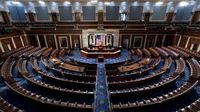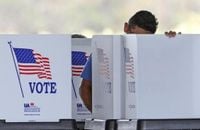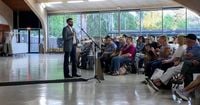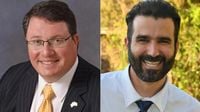Florida is gearing up for a significant political showdown as two special elections loom on April 1, 2025, in heavily Republican districts. The elections will determine successors for two congressional seats vacated by members who were appointed to positions in the Trump administration. The race in Florida’s Congressional District 6, previously held by National Security Adviser Mike Waltz, has unexpectedly turned competitive, raising eyebrows across the political spectrum.
The stakes are particularly high in CD 6, where Republican state Senator Randy Fine, endorsed by Trump, faces off against Democrat Josh Weil, a former public school teacher. Despite the district's Republican leanings—47% of registered voters are GOP compared to just 26% Democrats—Weil's campaign has gained traction, with reports indicating he has raised over $10 million, significantly outpacing Fine's fundraising efforts.
In a shocking twist, Weil has outspent Fine by approximately $8.2 million to $895,000, a disparity that has sent ripples of concern through Republican ranks. Fine's campaign has faced scrutiny for his lack of local residency prior to the election and his history of controversies, including a court-ordered anger management counseling.
Polls suggest the race is within the margin of error, reflecting a shift in voter sentiment. A recent St. Pete’s Poll indicates that 15% of Republican voters are crossing over to support Weil, a trend that has alarmed GOP leaders. Florida Governor Ron DeSantis has publicly predicted that Fine will "underperform" compared to previous elections, attributing this to a "candidate-specific problem."
Weil's campaign has effectively utilized Fine's vulnerabilities, launching ads that portray him as "dangerous" and "radical," even juxtaposing his image against a Chinese flag. This strategy may resonate with voters who are unfamiliar with Fine, who has not appeared on a ballot in the district until now.
As the election approaches, both candidates are making last-minute efforts to connect with voters. Fine remains optimistic, asserting that residents do not want a "Bernie Sanders socialist" representing them and emphasizing his alignment with Trump. Meanwhile, Weil is capitalizing on what Democratic National Committee Chair Ken Martin describes as a wave of "buyer’s remorse" among voters, suggesting that independent and even some Republican voters are leaning towards the Democratic candidate.
Historically, the outcome of this special election could set the tone for the 2026 midterms. If Weil performs well, it may signal a broader shift in voter attitudes, potentially jeopardizing Republican control in the House, where they currently hold a slim 218-213 majority with four vacancies. A defeat in this district, although unlikely, could send shockwaves through the GOP, prompting fears of a Democratic resurgence.
In the context of these elections, Trump has made strategic moves to consolidate his influence, recently withdrawing the nomination of Representative Elise Stefanik as the U.N. ambassador to avoid a potentially challenging special election for her seat. This decision underscores the precarious position Republicans find themselves in, as they navigate a tight margin in the House while attempting to maintain their agenda.
As the clock ticks down to election day, the outcome in CD 6 is shaping up to be a bellwether for both parties. The results could provide crucial insights into the political landscape heading into the 2026 elections, with implications that extend far beyond Florida.
With early and mail-in voting data showing Fine with a narrow 9-point lead over Weil, the race is proving to be more competitive than anticipated. This is particularly noteworthy given that Trump won the district by a staggering 30-point margin in the last election. Political analysts are closely watching this contest, as it could indicate shifting dynamics in a state that has traditionally favored Republican candidates.
In summary, the special elections in Florida's Congressional Districts 6 and 1 are poised to be pivotal moments in the current political climate. As candidates make their final appeals to voters, the outcomes will not only determine representation in Congress but also shape the narrative leading into the next election cycle. Regardless of the results, one thing is clear: the political landscape in Florida is evolving, and both parties must adapt to the changing sentiments of the electorate.









